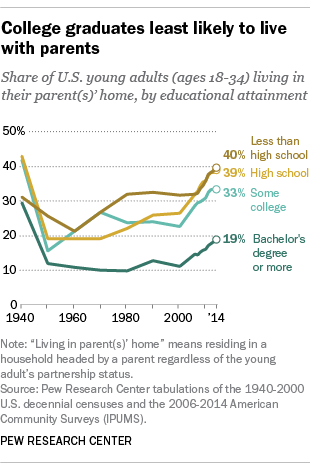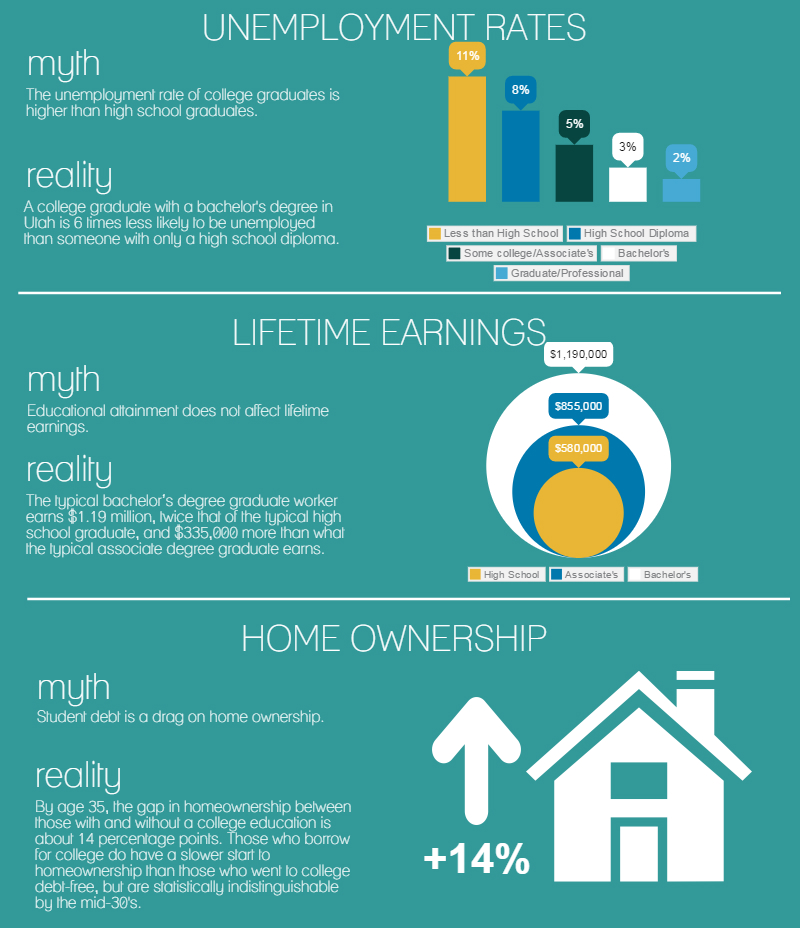 Recent headlines reported that for the first time in 130 years, more 18 to 34-year-olds live with parents than with partners. Some have attributed this trend to the lack of job prospects for college graduates, that the value of a college degree is diminishing, or that student debt is a drag on homeownership.
Recent headlines reported that for the first time in 130 years, more 18 to 34-year-olds live with parents than with partners. Some have attributed this trend to the lack of job prospects for college graduates, that the value of a college degree is diminishing, or that student debt is a drag on homeownership.
Understandably, 18 to 24-year-olds have long been the most likely demographic to live with parents. However, the increases since the Great Recession have been driven by the older 25 to 34-year-olds living with their parents at record or near-record levels. Taking a closer look by segmenting 18 to 34-year-olds by educational attainment, it shows college graduates are half as likely to live with parents than just high school graduates. This gap has steadily grown since the 1960s. In other words, the overall increased trend of young people living with parents isn’t so much that college grads are unable to get good paying jobs, as it is a result of challenging economic trends due to increased costs for homeownership and rent, health care, and cost of living, especially for young families, alongside generally slow wage growth.
Myth
There appears to be galvanized perception among the general public that college graduates are faring worse than their less-educated peers. Last week the New York Times launched an interactive quiz based on a series of three surveys with Google Consumer Surveys in which more than half of the survey respondents thought the jobless rate for college graduates was higher than that of high school graduates. With each survey, the question was restructured to ensure respondents were not misunderstanding the question. Yet, the myths appears to suffuse the facts. The New York Times concludes, “most people have probably heard these statistics before. Vaguely, somewhere. What’s remarkable is that this story has been unseated by a more emotional narrative. One that could be very costly to young people and society.”
Reality
Young college graduates consistently have a lower unemployment rate and higher wage rate than those of non-graduates—by at least 5%. Furthermore, lifetime earnings of college graduates, no matter the major, are consistently higher. Finally, rates of homeownership by college graduates are higher than ever.
The opportunities for 2016 college graduates look good, especially in Utah where job growth since 2011 has outpaced every other state. According to Michigan State University’s 2015-16 Recruiting Trends survey of 4,730 U.S. employers, expected annual hires will more than double for this year’s bachelor’s degree graduates compared with 2013-14. 74% of new hires are projected to be at the bachelor’s degree level. Total hires will be up 15% over last year, with the surge largely driven by the 15% increase for bachelor’s degree graduates. While the number of jobs recruiting at other degree levels are significantly smaller, their job prospects are also growing. (associate degrees: 23%, MBA: 10%, professional degrees: 23%).
How do college graduates fare? Take the quiz!

